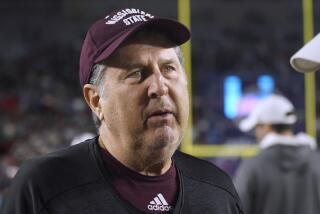Vaught Had Ole Miss at the Top of Its Game
- Share via
OXFORD, Miss. — Thirteen years have passed since John Vaught left college football’s sidelines, where win or lose, the coach watched impassively. His influence, though, lingers beyond the Ole Miss stadium that bears his name name.
“He is the E.F. Hutton of the program,” Rebel Coach Billy Brewer said. “When he speaks, people listen.”
Fans remember Vaught’s six Southeastern Conference titles and 18 postseason bowl appearances, even as this year’s Rebels are in the midst of their strongest season since 1971. Pro and college football teams still use the his variations on offense.
Without Vaught, the school has produced only two postseason bowl appearances and carried a 71-82-3 record going into this season. But this fall, the Rebels are 3-1 in the SEC (6-2-1 overall) and are bubbling under the Top Twenty rankings for the first time in years.
“Everybody can’t be in the Top 20, but we’re going to be back there,” Vaught said.
These days, Vaught prefers to play his games on a golf course, where he is no less competitive.
“I’ve shot my age several times in the last few months,” the 77-year-old said. “What bothers me is when some of my partners shoot their ages.”
Vaught lives on a 200-acre cattle farm six miles west of Oxford and still has an office at Ole Miss.
But, he said, “I try to stay out of their hair.” “Their” means Brewer and athletic director Warner Alford, two former Vaught players who studied the master while they sweated through his workouts.
“He kept things very simple, and relied heavily on great execution,” Alford, who considers Vaught one of his best friends, said. “We could do things blindfolded. We had great confidence in his plays, because it always worked.”
Vaught, who grew up in Texas, never wanted to coach.
“I was sort of drug into it,” he said. “When I got out of high school, it was 1932, the Great Depression, and there wasn’t much opportunity.”
He went to college hoping to become an engineer or to manage the wholesale electrical company where he worked during the summer. But he captained his Texas Christian University team as a guard, leading them to a Southwest Conference championship his senior year and becoming the school’s first All-American.
Years later, his playing abilities led to his induction in the Texas Hall of Fame. In 1969, the National College Football Hall of Fame asked him if he wanted to be inducted as a coach or a player. Vaught chose coach; that’s the way he’s listed in the Mississippi Hall of Fame.
But in the early days, he hated coaching so much he quit his job at a high school after one year.
“I went back to the electrical company and I thought this is where I’d be.”
Then Ray “Bear” Wolfe, his coach at TCU, took a coaching job at North Carolina and offered Vaught the assistant’s spot.
“Gosh Almighty, he offered me about four times what I was making. I had to go,” Vaught said.
He worked from 1936 to 1941 for North Carolina, then entered the Navy during World War II, rising to the rank of lieutenant commander.
After the war, he accepted a line coaching position at Ole Miss under Red Drew, then took over in 1947 as Drew left to coach Alabama. Vaught coached until 1970, when an angina attack pushed him into emeritus status.
After the Rebels started poorly in 1973, Vaught returned to finish the season before becoming athletic director for the next four years. The teams he coached went 180-53-12 and produced lasting alumni memories that haunt successors.
“The depth of those teams was just incredible,” Alford said.
Vaught had his pick of Mississippi’s high school graduates, and often carried three or four quarterbacks -- training and alternating.
“I don’t see why a quarterback should play the whole game, just like any other player,” Vaught said. “With the kind of offense we were running, I never felt comfortable without two or more.”
Quarterbacks Charles Conerly, Jimmy Lear, Jake Gibbs, Doug Elmore, Glynn Griffing and Archie Manning brought national fame to Ole Miss under his tutelage.
While the state and the university were castigated during the civil rights movement, Vaught’s teams lost only two Southeastern Conference games from 1959 to 1963, and were ranked as national champions in 1960.
“I think the football team was a stabilizing factor for the state, for the university and for the alumni,” Vaught said. “I don’t know what would have happened if we lost.”
More to Read
Go beyond the scoreboard
Get the latest on L.A.'s teams in the daily Sports Report newsletter.
You may occasionally receive promotional content from the Los Angeles Times.










